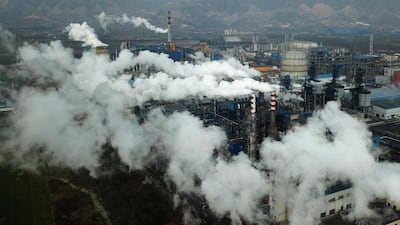The International Monetary Fund said the right mix of economic policy tools can still pave the road toward net zero emissions by 2050, as it warned of "catastrophic" consequences of climate change.
"Without further action to reduce greenhouse gas emissions, the planet is on course to reach temperatures not seen in millions of years, with potentially catastrophic implications," the Washington-based lender said in a chapter of its forthcoming World Economic Outlook to be released in full next week.
Global temperatures are on the trend to rise by 2-5 degrees Celsius by the end of the century if carbon emissions are not brought down to net zero by 2050, the IMF said.
Global temperatures could reach levels "not seen in millions of years, imposing growing physical and economic damage, and increasing the risk of catastrophic outcomes across the planet", the fund said.
In the first 15 years of climate change mitigation policy, gross domestic product is expected to rise by about 0.7 per cent on average, with the transition helping provide jobs to 12 million people.
The fund said taxing expensive fossil fuels is one way to de-incentivise the use of polluting fuels such as crude and shift their consumer consumption towards greener fuels. Total energy consumption falls too because, overall, energy is more expensive, it said.
However, subsidising green energy as a whole could prove to be a double-edged sword, leading to an overall increase in energy usage.
"Pairing carbon taxes with policies that cushion the impact on consumers’ energy costs can deliver rapid emissions reductions without major negative impacts on output and employment," IMF staff said in a separate blog post.
Energy transition, while likely to offer an initial boost to economic activity, is likely to still drag global GDP down by around 0.7 per cent on average every year between 2037-50 and by 1.1 per cent in 2050 relative to unchanged policies.
"Countries should initially opt for a green investment stimulus—investments in clean public transportation, smart electricity grids to incorporate renewables into power generation, and retrofitting buildings to make them more energy efficient,” the fund said.
The pivot to such policies will help boost both global GDP and employment in the initial years of recovery from the Covid-19 pandemic. Investment in green infrastructure will also improve productivity in low carbon sectors, incentivising the private sector to invest in them and making them easier to adapt to higher prices.
"As the recovery takes hold, preannounced and gradually rising carbon prices will become a powerful tool to deliver the needed reduction in carbon emissions,” the IMF said.
Other organisations such as the International Renewable Energy Agency have also called for accelerating efforts to decarbonise.
In May, the Abu Dhabi-based Irena said renewable energy carriers and building zero-carbon supply chains represent a $500 billion opportunity as economies continue to decarbonise.
The agency, which is headquartered in Masdar City, said decarbonisation of the global energy system away from fossil fuels to renewables could generate $98 trillion in cumulative growth between now and 2050, adding an extra 2.4 per cent to GDP.
A deep overhaul of fossil fuel-wired economies to function on cleaner energy sources could require as much as $130tn in spending, according to Irena.
The Covid-19 pandemic has proved an unlikely push for green transition amid falling emissions from halted air and ground travel.
However, with prices and demand for fossil fuels remaining weak, global investment in the energy sector as a whole is expected to decline by a fifth or nearly $400bn this year due to the impact of the pandemic on the industry, the International Energy Agency said earlier this year.


